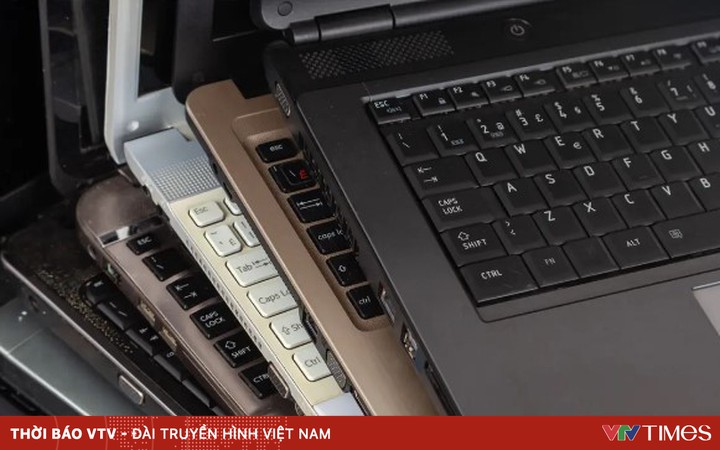Many companies develop virtual people with ambitions to enter the metaverse, but these are considered expensive, money-burning projects.
When six employees of Music – a platform specializing in commercial music copyright in Shanghai – took turns guiding and answering customers’ questions via social networks, no one thought they were all virtual.

Shape Metamuse. Photo: Music
A girl with brown hair, white skin, and a black camisole named Metamuse became a regular representative of Business. Metamuse has been around since late last year, not only representing the company as a “customer service manager”, but also a favorite singer. “She” used to perform Gongxi Gongxia traditional Chinese song celebrating the Lunar New Year.
Metamuse is a typical representative of the virtual people trend in China. Tong Xiaoyan, CEO of Business, said that they invest in this field because they believe that content related to metaverse will explode in the near future. According to her, virtual people have a much lower risk and level of risk than celebrities in the real world.
New trend
“You don’t need to worry about the risk of virtual people being turned upside down in public image,” said Xiaoyan, referring to the situation where many celebrities have been disgraced due to ethical, relationship or tax issues on the internet. Chinese Internet. “The operation of virtual people is also more flexible than real people.”
Todd Hessert Jiang, developer of tech company StarHeir Technology and former fashion designer, also thinks the upcoming trend is virtual people in the metaverse. “Simply put, a new space or a new land like the metaverse will need virtual people. Our goal will be to focus on them,” Jiang said.
Since last year, virtual idols appear more on Internet platforms in China. Among them is Cui Xiaopan of Chinese real estate developer Vanke, or Ayayi – China’s first virtual KOL on the e-commerce and social media platform Xiaohongshu.
According to iiMedia, the virtual person market size is about 107.5 billion yuan ($16.9 billion) in 2021 and is expected to reach 333.5 billion yuan ($52.3 billion) in 2023.
“The adoption of virtual people in social and business environments is part of a new generation of young people,” commented James Cheng, senior director at global consulting firm Roland Berger. “This generation grew up with cartoons, so they are receptive to virtual characters.”
Virtual people-related technologies accumulated two or three years ago, but 2022 is considered a “booming point”. That has been proven over time with the participation of a series of big names such as Alibaba, Tencent, Baidu and ByteDance. Alibaba last year launched a virtual product to support merchants on its e-commerce platform. ByteDance provides technology for A-Soul, a popular virtual idol group under Yuehua Entertainment. Baidu has also released technology to support sign language for virtual people.
The race to burn money
Virtual people promise to bring many benefits, but not all businesses can participate in this field, because they need to make a large investment but are not sure to get the expected results.
According to Ms. Xiaoyan, the virtual race is currently a money-burning game. “We’ve invested more than a million yuan ($150,000) in Metamuse, but haven’t gotten anything yet. Basically, the game is still for the rich and determined not to profit,” Xiaoyan said.
Many companies say that operating a virtual person is equally expensive and not easy. Liu Yexi, the famous virtual beauty expert, is said to have a support team of more than 100 people behind. Liang Zikang, CEO of Chuangyi Technology – the company that owns Yexi, in an interview last year said the cost per second for virtual people “equivalent to 2-3 grams of gold”.
Li Shiyan, head of Baidu Cloud’s human-machine interaction lab, says the technology for building virtual people is still in its infancy. “When it comes to mass production, there are still questions about technology, time and cost barriers. The problem can be partially solved by WHObut cannot accelerate progress,” Shiyan said.
With great costs, some businesses said they would focus on certain virtual people instead of developing rampantly. Last December, StarHeir received a $1.57 million investment from game studio NetEase. However, the company only plans to develop 15 virtual idols in China and another 15 characters for overseas markets.
How do virtual people make money?
One of the most popular ways for virtual people to make money is to have them represent brands and appear in advertisements, similar to celebrities. For example, five virtual idols of StarHeir have collaborated with the DFS chain of stores, the sound company Sennheiser (Germany) and the cosmetic brand Clarins (France) to promote their products. Music’s metamuse also focuses on introducing food to Caizhizhai and plans to release a music album. Last month, MonoC, a virtual artist in Hong Kong, also created and successfully sold NFT for more than $24,000.

StarHeir’s five virtual idols. Photo: StarHeir Technology
Some virtual people simply represent companies. miHoYo, famous game developer Genshin Impact, creating Lumi virtual people to promote the company’s products. This character currently has more than a million followers on the video network Bilibili since appearing in May 2020.
Platforms like Bilibili themselves are considered to be the birthplace of a mass of virtual people, China’s virtual idols. Along with real people, the company views virtual vloggers as a way to enrich and complement content.
While virtual people can solve some of the problems of real-life celebrities, they are not without risks. For example, Kizuna AI, one of the famous virtual idols that appeared on YouTube 5 years ago, controversially said that virtual people will replace real celebrities in the future. This idea received much criticism, forcing the company behind it to stop updating indefinitely.
Virtual people also lose their attractiveness over time. Ayayi’s first post on Xiaohongshu attracted more than three million views, but the content currently has only 100 views due to being criticized for being uncreative, even fake.
According to Aiaiai, who loves virtual idols and now lives in Zhejiang province, virtual people don’t have much personality right now. “They were born just to make money. The only difference from regular idols is that they don’t appear in real life,” Aiaiai said.
Bao Lam (according to SCMP)
at Blogtuan.info – Source: vnexpress.net – Read the original article here



